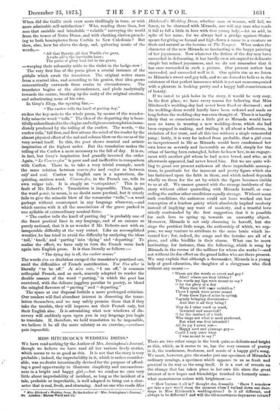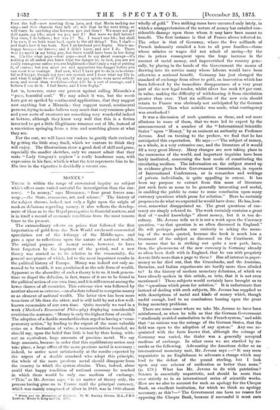MISS HITCHCOCK'S WEDDING DRESS.*
WE have read nothing by the Author of Mrs. Jerningham's Journal, though we believe we have read all her various lively stories, which seems to us so good as this. It is not that the story is very probable ; indeed, the improbability in it, which is rather consider- able, was no doubt intentionally devised for the purpose of afford- ing a good opportunity to illustrate simplicity and unconscious- ness in a bright and happy girl ;—but we confess we care very little about improbability of incident, so long as the incident of a tale, probable or improbable, is well adapted to bring out a char- acter that is real, fresh, and charming. And no one who reads Miss • Miss Hiteheoek's Wedding Dress. By the Author of "Mrs. Jerningham's Journal, An. ,London: Marcus Ward and Co.
Hitchcock's Wedding Dress, whether man or woman, will fail, we fancy, to be charmed with Miranda, nor will any man who reads it fail to fall a little in love with that young lady,—let us add, in spite of her name, for we always had a grudge against Shake- speare forgiving so formal and high-flown a name to a creature so fresh and natural as the heroine of The Tempest. What makes the character of the new Miranda so fascinating is the happy painting of her joyousness. Now whatever the fiction of the day may have succeeded in delineating, it has hardly even attempted to delineate simple but refined joyousness, and we do not remember that it has once succeeded in such a picture. Our present author has succeeded, and succeeded well in it. Our spirits rise as we listen to Miranda's sweet and gay talk, and we are forced to believe in the existence of that perfect innocence which is yet not unaccompanied with a pleasure in looking pretty and a happy half-consciousness of beauty.
If we cared to pick holes in the story, it would be very easy. In the first place, we have every reason for believing that Miss Hitchcock's wedding-day had never been fixed or discussed ; and the wedding-dress would hardly have been ordered and made so- long before the wedding-day was even thought of. Then it is hardly likely that so conscientious a little girl as Miranda would have seen no harm in wearing a new wedding-dress, which she had been engaged in making, and trailing it all about a ball-room, is violation of her trust, and all this too without a single remorseful pang ; lastly, it is very far indeed from probable, that a girl-even so inexperienced in life as Miranda would have condemned her- own lover so severely and inexorably as she did, simply for the crime of having been entangled, before he knew her, in an engage- ment with another girl whom he had never loved, and who, as it afterwards appeared, had never loved him. But we are quite wil- ling to grant our present authoress all these improbable assump- tions, in gratitude for the innocent and pretty figure which she has fashioned upon the faith in them, and which indeed depends wholly on them for the art by which the figure becomes visible to us at all. We cannot quarrel with the strange incidents of the story without either quarrelling with Miranda herself, or con- ceding the author other conditions equally strange. Without some such conditions, the authoress could not have worked out her conception of a fearless gaiety which absolutely implied modesty instead of implying any want of modesty, and a trustful love utterly confounded by the first suggestion that it is possible for such love to spring up towards an unworthy object. Moreover, Miranda is not only charming in herself, but she sings the prettiest little songs, the authorship of which, we sup- pose, we may venture to attribute to the same brain which in- vented her ; for, indeed, the songs and the heroine are all of a piece, and alike birdlike in their charm. What can be more fascinating, for instance, than the following, which is sung by Miranda in the rooms of the milliner for whom she works ?—and not without its due effect on the grand ladies who are there present. We may explain that although a dressmaker, Miranda is a young lady of good education, the daughter of a clergyman who died without any means :-
"Where are the words so sweet and gay ? Alas ! where are they bidden ?
The words my lips were meant to say ? 0 for the glory of a day.
When they will come unbidden ! Those I speak were never meant From these lips of mine to spring, Vaguely bringing discontent— And that is all they bring
Why do I utter word on word, Invented and amended?
0 for the instinct of a bird, Who sings not what is most preferred, Bat what was first intended !
All its joy I covet not— Happy nest and plumage gay—
Could I only utter what I was meant to say 1"
There are two other songs in the book quite as delicate and bright as this, which, as it seems to us, has the very essence of poetry in it, the tenderness, freshness, and music of a happy girl's song. We must, however, give the reader just one specimen of Miranda's. ordinary musings, a specimen which appears to us as fresh and poetical in its way as the song itself. It is a sort of reverie on the change that has taken place in her own life since the great interest of new hopes and friendships touched its formerly some- what monotonous colour with brightness :—
"' How Curious it all is !' thought she, dreamily. 'Have I somehow got into a new world since the moment when I walked down our door- steps in Miss Hitchcock's wedding-dress? Is it all different, and always to be different ? and will the old monotonous days never return? First the ball—now meeting them here, and that Maria making me sing—and this charade they talk of ; will that be the next thing, or will there be anything else between now and then? We must not get dull again, my life ; must we, you and I ? But were we dull before ? You were, I do believe ; but was I? No. I wasn't one bit ; but shall I be no v, if we both went back again to the old thing? Yes, I shall— and that's how it has been. Now I understand poor Sophy. She is un- happy because she knows; and I didn't know, and now I do. There was no merit ii my being gay, but there would have been in her doing so. It's like what papa—dear papa—used to say about courage—it's nothing at all unless you know what the danger is; in fact, you are not really courageous unless you are frightened—that's only a way of putting it, of course; but you must see and appreciate the danger before you can show true courage. And now, what I have got to do is to be cheer- ful ai:d happy, though my eyes are opened, and I know what my life is, -and what it might be—if I'm not, all my gay spirits wore mere selfish- ness, and worse than wortlaloss—that will be a sort of courage, and I believe I can do it. I feel brave, and I love Sophy."
Let us, however, enter our protest against calling Miranda's a "pure, beautiful soul." We may admit it was, but the words have got so spoiled by sentimental applications, that they suggest now anything but a Miranda ; they suggest unreal, sentimental persons, trying to make-believe very much that very common -place and poor sorts of creatures are something very wonderful indeed at bottom, although they know very well that this is a fiction invented to get a little illegitimate romance out of life, instead of a conviction springing from a true and searching glance at what they see.
For the rest, we will leave our readers to gratify their curiosity by getting the little story itself, which we venture to think they will enjoy. The illustrations show a good deal of skill and grace, especially the smaller sketches, only we cannot admit that they make "Lady Gregory's nephew" a really handsome man, with expression in his face, which is what the text represents him to be. His face in the vignettes is decidedly a vacant one.



































 Previous page
Previous page